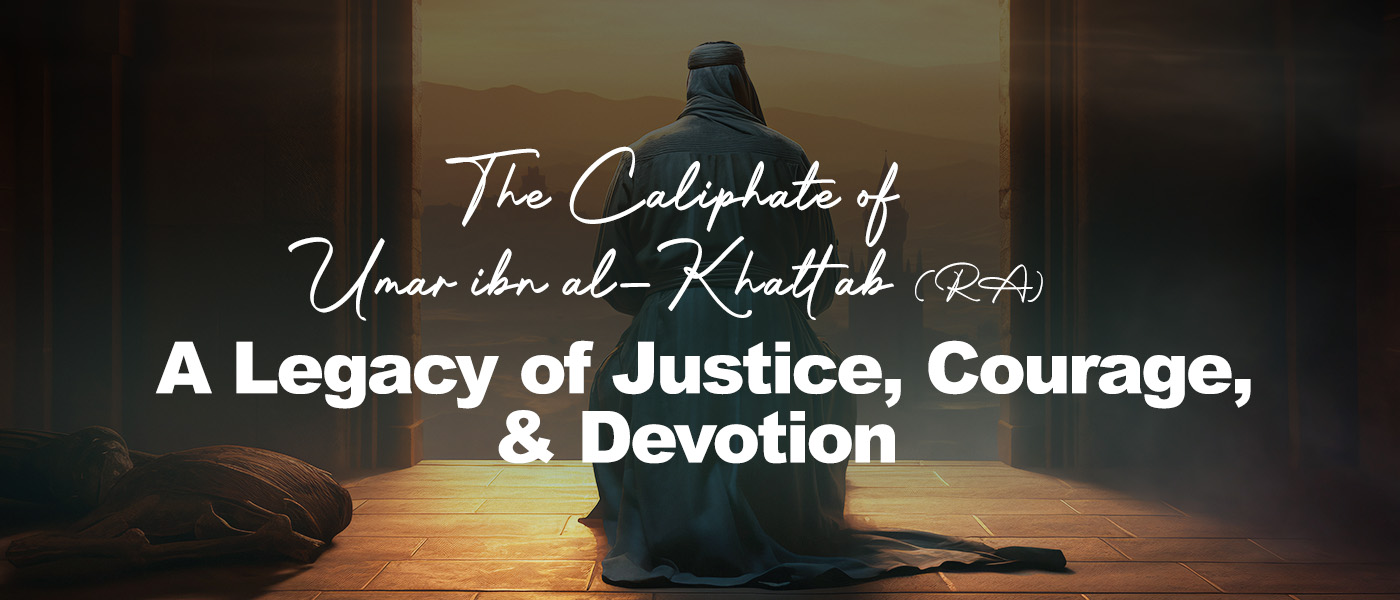
Long before the rise of the Islamic empire, a man walked in Arabia with such presence that even his enemies paused. ʿUmar ibn al-Khattab (RA) was tall, broad-shouldered, and physically imposing. His skin was fair with a reddish hue, and his voice was deep and commanding. He was known to walk so fast that people struggled to keep pace with him and, when he spoke, his words struck with clarity and conviction.
Born around 584 AD into the noble tribe of Quraysh, Umar ibn al-Khattab (RA) grew up in a society steeped in tribal loyalty and idol worship. He was a skilled wrestler, horseman, and poet. He was also one of the few Qurayshis who could read and write – a rare skill in pre-Islamic Arabia. His intellect was sharp, and his judgment so sound that Quraysh often appointed him as a mediator in tribal disputes. These qualities – strength, eloquence, and wisdom – would later become pillars of his leadership.
But his greatest transformation came not through battle or politics, but through revelation
The Turning Point
The story of ʿUmar ibn al-Khattab’s (RA) conversion is one of the most dramatic in Islamic history. He was on his way to kill the Prophet Muhammad (SAW), enraged by what he saw as a threat to Qurayshi tradition. Along the way, he learned that his own sister and brother-in-law had secretly embraced Islam. He stormed into their home in anger, but paused when he heard his sister recite a verse of the revelation:

Something shifted. The words pierced through his rage. He asked to read more. And in that moment, the man who had once vowed to extinguish Islam became one of its fiercest defenders.
The Prophet Muhammad (SAW) had prayed:
“O Allah! Strengthen Islam with either Abu Jahl or ʿUmar ibn al-Khattab (RA).” (Jami al-Tirmidhi)
Allah (SWT) chose ʿUmar ibn al-Khattab (RA).
Unlike many early Muslims who worshipped in secret, ʿUmar ibn al-Khattab (RA) declared his faith publicly. He marched to the Ka’bah and led Muslims in prayer, daring anyone to stop him. He famously said:

His boldness earned him the title al-Faruq: the one who distinguishes between truth and falsehood. Due to his strength and outspokenness, Muslims became less afraid to practice their faith more openly.
At the Prophet’s (SAW) Side
ʿUmar ibn al-Khattab (RA) became one of the Prophet’s (SAW) closest advisers. He fought in every major battle – Badr, Uhud, Khandaq – standing firm beside the Prophet (SAW). At Uhud, when Abu Sufyan taunted the Muslims, ʿUmar ibn al-Khattab (RA) shouted back: “You are a liar, O enemy of Allah!” (Sahih al-Bukhari)
His vigilance extended beyond the battlefield. When a man named Ibn Sayyad claimed prophethood, ʿUmar ibn al-Khattab (RA) asked the Prophet (SAW) for permission to kill him. The Prophet (SAW) declined, saying: “If he is the Dajjal, you will not be able to kill him.” (Sahih Muslim)
His opinions were even often affirmed by divine revelation, a testimony to his clarity of thought and intent. A few examples, as recorded in Sahih al-Bukhari, include:
- Maqam Ibrahim as a Place of Prayer
During the early days in Madinah, ʿUmar ibn al-Khattab (RA) suggested to the Prophet (SAW) that the station of Abraham (Maqam Ibrahim) – the stone upon which Prophet Ibrahim (AS) stood while building the Ka’bah – should be designated as a place of prayer. This was a moment of reverence and continuity with the Abrahamic legacy.

This verse institutionalized the practice of praying two rakʿat after tawaf at Maqam Ibrahim, a ritual still observed by pilgrims today. It also affirmed ʿUmar ibn al-Khattab’s (RA) spiritual insight and connection to the legacy of monotheism.
- The Veiling of the Prophet’s (SAW) Wives
Concerned about the privacy and dignity of the Prophet’s (SAW) household, ʿUmar ibn al-Khattab (RA) urged the Prophet (SAW) to have his wives remain hidden in the presence of visitors, since all kinds of people would visit him.

This marked the formal introduction of the hijab for the Prophet’s (SAW) wives, setting a precedent for modesty and boundaries in Islamic ethics. It also demonstrated ʿUmar ibn al-Khattab’s (RA) protective nature and his concern for communal morality.
- Warning to the Prophet’s (SAW) Wives
When the Prophet’s (SAW) wives, including Umar ibn al-Khattab’s (RA) daughter Lady Hafsah (RA), were being difficult, ʿUmar ibn al-Khattab (RA) warned them that if they continued to trouble the Prophet (SAW), Allah (SWT) could replace them with better wives.

This verse echoed ʿUmar ibn al-Khattab’s (RA) exact words, reinforcing his moral clarity and role in defending the Prophet’s (SAW) emotional and spiritual well-being.
Family and Personal Life
Behind the statesman was a devoted father and husband. ʿUmar ibn al-Khattab (RA) was married to noble women, including Zaynab bint Mazʿun, sister of ʿUthman ibn Mazʿun (RA), ʿAtiqah bint Zayd, who was known for her piety and intellect, and Lady Umm Kulthum bint Ali ibn Abu Talib, daughter of Ali ibn Abu Talib (RA) & Lady Fatima bint Muhammad (RA) and granddaughter of the Prophet (SAW), symbolizing the strong unity among the Prophet’s (SAW) companions.
Among ʿUmar ibn al-Khattab’s (RA) children were ʿAbdullah ibn ʿUmar (RA), a renowned scholar and narrator of hadith, ʿAsim ibn ʿUmar (RA), known for his piety and wisdom, and Lady Hafsah bint ʿUmar (RA), who became one of the Mothers of the Believers when she was married to the Prophet (SAW).
That marriage deepened the bond between the Prophet (SAW) and ʿUmar ibn al-Khattab (RA), and Lady Hafsah (RA) later became the guardian of the compiled Quran manuscript during the caliphates of Abu Bakr as-Siddiq (RA) and ʿUthman ibn Affan (RA).
The Mantle of Leadership
When Abu Bakr as-Siddiq (RA) passed away in 13 AH, he named ʿUmar ibn al-Khattab (RA) as his successor. The decision was met with admiration and Abu Bakr as-Siddiq (RA) told the people: “He is strong, but he will be gentle when he becomes responsible.”
So began one of the most transformative caliphates in Islamic history, marking a golden era in Islamic governance, defined by justice, accountability, and expansion of the Islamic state.
Expansion Without Excess
Under ʿUmar ibn al-Khattab’s (RA) leadership, the Islamic state expanded rapidly. His generals – Khalid ibn al-Walid (RA), Sa’d ibn Abi Waqqas (RA), and ʿAmr ibn al-‘As (RA) – led campaigns that brought Persia, Greater Syria, Egypt, and Iraq under Muslim rule. But these were not conquests for wealth or power. ʿUmar ibn al-Khattab (RA) instructed his commanders to uphold justice, protect civilians, and honor treaties.
In 637 CE, he personally accepted the surrender of Jerusalem. The Christian Patriarch Sophronius handed him the keys to the city. When invited to pray inside the Church of the Holy Sepulcher, ʿUmar ibn al-Khattab (RA) declined, fearing Muslims might later claim it as a mosque. Instead, he prayed outside, where Masjid ʿUmar stands even today.
Architect of the Islamic State
ʿUmar ibn al-Khattab (RA) was not merely a conqueror, he was a visionary statesman. His reforms transformed the Islamic state from a tribal society into a structured and principled government.
He divided the empire into provinces, each governed by a Wali. These provinces were further subdivided into districts, ensuring efficient local governance.
He established the Bayt al-Maal, a public treasury that managed zakat, war booty, and state funds. This ensured that wealth was distributed fairly and the poor were cared for.
He introduced the Diwan system – or bureau of records, including:
- Diwan al-Jund: A military registry that recorded soldiers’ names, ranks, and salaries. This allowed for organized payroll and ensured that veterans and their families were cared for.
- Diwan al-Kharaj: A bureau for land taxation, which regulated agricultural revenues and ensured fair distribution of wealth across provinces.
- Diwan al-Riqab: A system for managing the affairs of freed slaves and ensuring their integration into society.
ʿUmar ibn al-Khattab (RA) also established a regular consultation (shura), the Islamic calendar based on the Hijrah, and a postal system. He further appointed market inspectors (muhtasibs) to prevent fraud and created a welfare structure that supported orphans, widows, and the disabled. His governance was not reactive – it was visionary, proactive, and deeply rooted in Islamic ethics.

A Caliph Among the People
Despite ruling over a vast empire, ʿUmar ibn al-Khattab (RA) lived with striking simplicity. He wore patched garments, refused lavish meals, and often slept on the bare ground. He rejected the trappings of power and insisted on being held accountable.
He was known to walk the streets of Madinah at night, checking on his people. In one famous incident, he overheard a mother diluting milk to increase profit. Her daughter objected, saying ʿUmar ibn al-Khattab (RA) had forbidden such deceit. Moved by her honesty, he later arranged her marriage to his son ʿAsim. She would become the grandmother of Caliph ʿUmar ibn ʿAbd al-ʿAziz (RA), one of the most righteous rulers in Islamic history.
An affirmation of his extreme urgency toward accountability beginning with himself, ʿUmar ibn al-Khattab (RA) once said: “If a mule were to stumble in Iraq, I fear that Allah would ask me, ‘Why did you not level the road for it, O ʿUmar?’” (Musnad Ahmad) Such profound accountability exemplified the Islamic ideal of leadership rooted in taqwa.

His martyrdom came tragically in 23 AH, when he was stabbed during Fajr prayer by a Persian slave named Abu Lu’lu. As he lay on his deathbed, he appointed a council of six to select the next caliph, once again prioritizing the unity and future of the Ummah over personal interests.
His last wish was a request to Lady Ayesha bint Abu Bakr (RA) to be buried next to the beloved Prophet (SAW) and Abu Bakr as-Siddiq (RA). She honored this wish, and he was laid to rest as requested. At his burial, Ali ibn Abi Talib (RA) said, “O `Umar! You have not left behind you a person whose deeds I like to imitate and meet Allah with more than I like your deeds. By Allah! I always thought that Allah would keep you with your two companions, for very often I used to hear the Prophet (SAW) saying, ‘I, Abu Bakr and `Umar went (somewhere); I, Abu Bakr and `Umar entered (somewhere); and I, Abu Bakr and `Umar went out.’” (Sahih al-Bukhari)
Relevance to Today
Umar ibn al-Khattab’s (RA) life offers enduring lessons for Muslims across generations. His governance teaches that true leadership is founded on justice and service to the people. His courage reminds us that strength must be guided by principle and mercy. Most importantly, his deep awareness of accountability before Allah (SWT) reminds every believer that success in this world and the next lies in humility and sincerity.
In a world where leadership often bends to popularity, profit, or power, the example of ʿUmar ibn al-Khattab (RA) stands as a moral compass. He was unafraid to speak truth – even when it was uncomfortable. He held himself accountable before Allah (SWT) and the people, never hiding behind status or authority.
Today, as the Ummah grapples with injustice, corruption, and inequality, his legacy reminds us that leadership is not about control, but about service. Imagine a leader who walks the streets at night to check on the poor. Who fears divine judgment for the suffering of a single animal. Who weeps in prayer, yet stands firm against oppression.
This is a theme we will continue to find among the companions of the Prophet (SAW) who served as leaders; clearly inspired by and emulating their common thread – the best of mankind, the Prophet (SAW) himself.
The life of ʿUmar ibn al-Khattab (RA) challenges us to ask: Are we silent in the face of injustice? Or do we, like ʿUmar ibn al-Khattab (RA), speak with courage, act with integrity, and lead with humility?
Dua: A Prayer for Justice and Leadership
O Allah, just as You honored Islam through ʿUmar ibn al-Khattab (RA), honor our hearts with sincerity, our communities with justice, and our leaders with humility.
Grant us the courage to speak truth like al-Faruq, the wisdom to govern with compassion, and the strength to serve without pride.
Make us among those who walk humbly, fear You deeply, and strive for righteousness in every step.
Unite our Ummah with the spirit of accountability and mercy, and let the legacy of ʿUmar ibn al-Khattab (RA) live on in our actions, our prayers, and our hopes.
Ameen!



